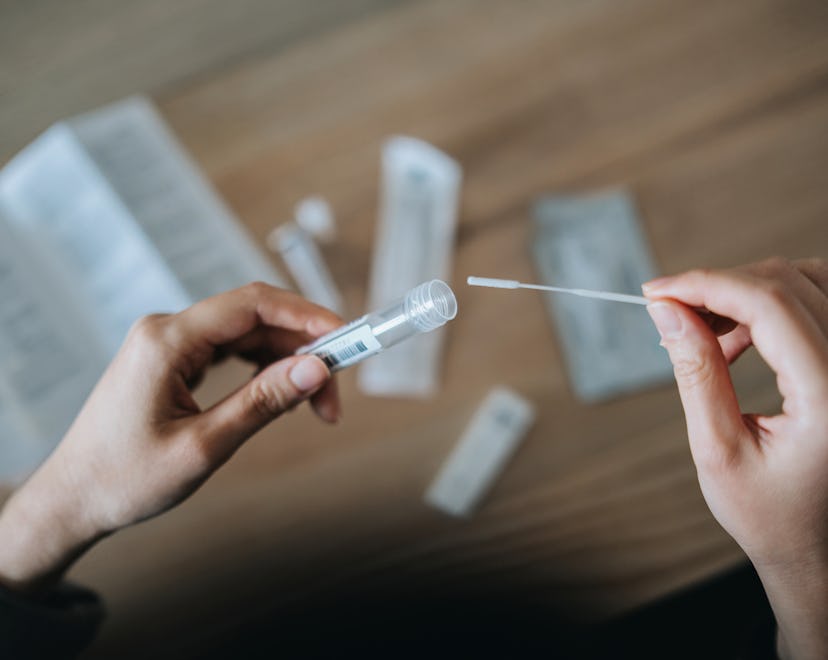Covid-19

What You Need To Know About Throat Swab Covid Tests
It’s a real thing, but experts urge caution if you go this route.
By now, you can probably open up and administer an at-home Covid test for yourself (or child) in your sleep. But some people are are exploring the option of swabbing the throat (as opposed to nose) for a — fingers crossed — more accurate test result. Swabbing your throat for a Covid test is an option with some home-use rapid tests in countries outside of the United States, but it is an option that comes with many caveats.
Should you swab your throat for Covid?
You should swab your throat for Covid only if the test’s directions instruct you to. The type of Covid test that you use will determine whether or not you should swab your throat or nose.
If you purchase a Covid rapid test in the U.S., it is highly unlikely that you need to swab your throat. “Currently there are no products in the United States that are approved through the FDA for use as a throat swab for Covid,” Dr. Chinwe Mahaley, a pediatrician with Greenspring Pediatrics in Baltimore, tells Romper. “In the United States, the official word is that nasal swabbing works well for rapid tests.”
Mahaley tells Romper that concerns over efficacy of throat swab Covid tests led to the FDA’s recommendations.
Recent discussion of Omicron’s sore throat symptoms, however, have given way to questions about whether or not people should be swabbing their throat when using a Covid rapid test at home.
“The observation is that with the newer Covid variants, people notice a sore throat first, so people wanted to see about testing from the throat,” Dr. Luis Ostrosky, medical director of epidemiology at Memorial Hermann in Houston, tells Romper. “The tests where you swab from the throat aren't widely available, so I don't recommend them.”
Outside of the U.S., other countries do manufacture and distribute at-home throat swab tests for Covid. However, these tests are not readily available in the states, and their accuracy has been questioned by experts. “Currently the consensus in the United States and manufacturers of the rapid antigen Covid tests do not recommend throat swabbing for the detection of antigen material,” Mahaley says.
Will a throat swab give you an accurate Covid test result?
The answer to whether swabbing your throat with a test designed to be used in the nose will give you an accurate test result is simply, “We don't know yet,” according to Ostrosky. “Since the tests weren't designed to be used this way, and we only have small studies or anecdotal stories, we can't say yet.”
Nasal swab test kits — like ones readily available over-the-counter and free to order through the Covid.gov website — are an accurate way to test for Covid at home. For example, Abbot Company’s BinaxNOW nasal swab test kits have an accuracy rate of 84.6% in detecting infection, and are 98.5% accurate at correctly identifying negative test results, according to the company’s website.
“There are some small studies that suggest that the nasal swab may pick up Omicron later then if the swab was done on saliva/throat, but the recommendation there is that if a person gets a negative test on a nasal swab but still has symptoms 1-2 days later then it may be worthwhile repeating another at-home nasal swab,” Mahaley says.
If your Covid test was made or purchased in the U.S., following package directions will yield the most accurate results. “The tests that people are using regularly require a nasal swab,” Ostrosky says. “The test isn't designed for a throat swab, so you might not get an accurate result. If you are using these tests differently, the results aren't reliable.”
How to swab your throat for Covid
To learn how to swab your throat for Covid, it is important to follow your test package’s instructions if you happen to get your hands on a test designed to be used that way. Keep in mind that whether your test is meant to be used in the nose or throat, you should swab in only one of these areas, not both.
“The steps for the at-home Covid throat swab test are likely very similar to the at-home nasal swab testing, but it may also vary depending on the product/manufacturer,” Mahaley tells Romper. “The best thing to do is read the package instructions for the at-home test very carefully and follow the instructions as closely as possible for the best results. If the test says that a throat swab is acceptable, then follow the instructions in the insert for the at-home test for throat swabbing.”
Once again, however, throat swab tests are still not the primary tool recommended in the U.S. to accurately detect Covid infection. “I recommend sticking to the nasal tests right now,” Ostrosky tells Romper.
The bottom line: Follow your test’s instructions for the most accurate results.
Experts:
Luis Ostrosky, M.D., Medical Director for Epidemiology at Memorial Hermann
Dr. Chinwe Mahaley, pediatrician, Greenspring Pediatrics in Baltimore